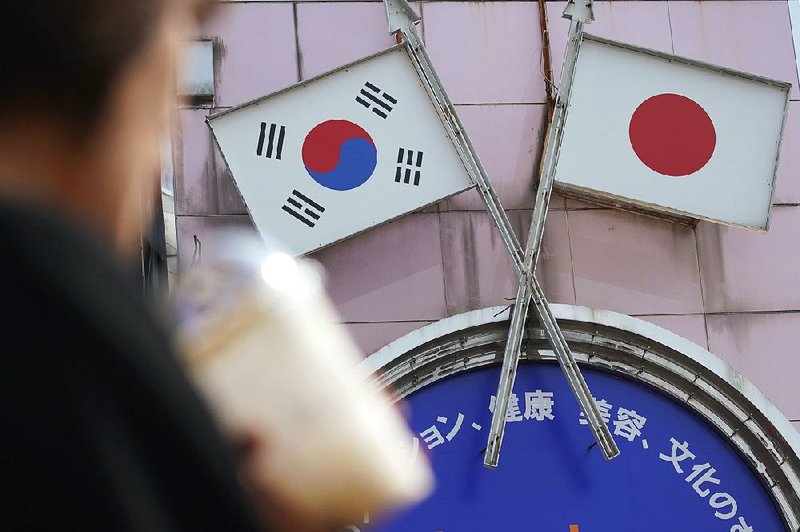TOKYO -- Japan's Cabinet on Friday approved the removal of South Korea from a list of countries with preferential trade status, prompting retaliation from Seoul, where a senior official summoned the Japanese ambassador and told him that South Koreans may no longer consider Japan a friendly nation.
The decision expanding controls over exports of sensitive materials takes effect Aug. 28. It follows an earlier requirement that Japanese exporters to South Korea be approved on a case-by-case basis for three materials used in semiconductors, smartphones and other high-tech devices -- South Korea's key exports.
Trade Minister Hiroshige Seko said the decision was needed to "appropriately carry out export controls for national security purposes" and was based on South Korea's "insufficient" export controls.
In addition to escalating tensions between the Asian neighbors, the move will ripple across the high-tech sector, further affecting supply chains already rattled by U.S.-China trade tensions.
The loss of preferential trade status will apply to dozens more products on a list of items that potentially could be converted to weapons. That's in addition to more than 200 other items requiring individual inspection for exports to all countries. Ending South Korea's "white country" status would also mean Japan could limit exports of any product on national security grounds.
South Korea's President Moon Jae-in, before heading into an emergency Cabinet meeting to discuss the Japanese measures, vowed stern countermeasures against Japan's planned downgrading of his country's trade status, calling it an attempt to contain South Korea's economic growth and harm global supply chains. Moon accused Japan of retaliating against South Korean court rulings that ordered Japanese companies to compensate Korean plaintiffs for their wartime labor during Japan's 1910-1945 colonization of the Korean Peninsula.
"There are deep wounds between Korea and Japan due to our unfortunate history. However, our two countries have long endeavored to heal the wounds by using stitches, medicine and bandages. Nonetheless, if Japan, the aggressor, reopens the old wounds after so long, an international community aware of the facts will never tolerate it. Japan must squarely face up to this," Moon said.
He said South Korea today is one of the world's top democracies and economic powers with the potential to fully overcome the difficulties. "However, if we succumb to challenges, history will repeat itself. If we take the current challenges as an opportunity instead and turn them into a chance to make a new economic leap, we can fully triumph over Japan. Our economy can surpass Japan's," he said.
South Korea says the Japanese trade curbs could hurt its export-dependent economy and has accused Japan of weaponizing trade to retaliate over disputes stemming from wartime history.
The South Korean presidential office said Seoul will consider ending a military intelligence-sharing pact with Tokyo as part of countermeasures against Japan. The pact's renewal is coming up later this month.
South Korea's Foreign Ministry summoned the Japanese ambassador and Vice Foreign Minister Cho Sei-young told him Japan's trade measures betray a history of cooperation and that South Koreans may no longer consider Japan a friendly nation because it imposed what Seoul sees as an economic retaliation.
South Korea's Finance Minister Hong Nam-ki said Seoul will also take steps to remove Japan from its own "whitelist" of nations receiving preferential trade treatment, and speed up efforts to file a complaint with the World Trade Organization.
Japan denies Seoul's allegation that the export controls were retaliation for South Korean court rulings allowing Japanese companies' assets to be seized as compensation for their wartime use of Korean laborers.
"We have no intention whatsoever to affect relations between Japan and South Korea, and it's not meant to be retaliation on something to begin with," Seko said. "I hope South Korea understands that this is not an export ban."
The trade spat came as relations between the two neighbors have soured over South Korea's demands for compensation for their harsh labor for Japanese companies before and during World War II, an issue Japan says was "completely and finally" settled under the 1965 treaty normalizing relations.
Information for this article was contributed by Kim Tong-hyung of The Associated Press.
A Section on 08/03/2019
